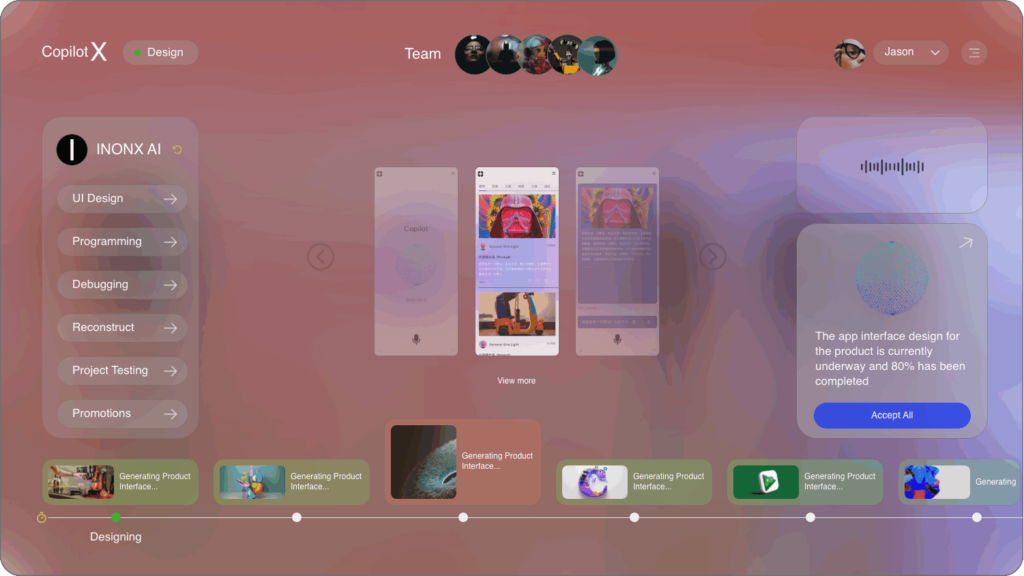The landscape of Artificial Intelligence (AI) has continuously evolved, especially as we venture into 2024. With remarkable advancements in large models, new tools, and innovative products, the AI ecosystem is seeing transformative applications across varied industries ranging from healthcare to education. Here, we explore the most notable developments that have emerged recently, including Google Gemini 1.5 Pro’s multimodal capabilities, the rise of specialized AI technologies, and the launch of innovative products targeting enterprise and cybersecurity.
The unveiling of the Google Gemini 1.5 Pro marks a significant leap in AI large models. Building on its predecessor, Gemini 1.5 Pro introduces unprecedented multimodal capabilities that seamlessly integrate text and imagery. This means that users can leverage the model to generate comprehensive content that includes both written and visual elements, making it invaluable for creative industries. Furthermore, Gemini 1.5 Pro features extended context understanding, allowing it to process and analyze larger input sequences, significantly improving the quality of generated responses. According to Google AI’s research team, this enhanced context comprehension enables Gemini to maintain coherence in longer conversations and to deliver more nuanced and contextually relevant responses, catering to diverse applications from storytelling to advanced data visualization and interpretation (source: Google AI Blog, March 2024).
To support these advancements, AI developers are releasing a slew of tools and APIs that utilize advanced AI functionalities for myriad tasks across industries. For instance, companies are now leveraging AI-driven platforms for Automated Design purposes, enabling designers to generate prototypes and finalized products with minimal manual intervention. These tools utilize machine learning algorithms to automate the design process, reducing turnaround time and allowing for greater creative flexibility (source: TechCrunch, March 2024).
Moreover, APIs such as OpenAI’s new suite enable businesses to integrate AI-driven insights into their existing workflows, particularly in sectors like business automation and software development. By simplifying data analysis and automating routine tasks, these tools empower organizations to optimize their operations and focus on higher-value activities. For example, the API allows for intelligent document processing, where businesses can extract key information from multiple sources and compile it into coherent reports, drastically reducing human effort in administrative tasks (source: VentureBeat, April 2024).
As organizations increasingly adopt AI technologies, there is a growing focus on addressing specialized use cases, particularly in the development of more reliable and debiased large language models (LLMs). One emerging direction in AI research is the application of unsupervised learning techniques combined with reinforcement learning. This hybrid approach allows models to learn more effectively from unstructured data while minimizing biases that can skew their outputs. Researchers are diving deep into methodologies that increase model transparency and accountability, ensuring algorithms can be audited for biases, particularly in sensitive applications such as recruitment and lending (source: MIT Technology Review, February 2024).
In the realm of product innovation, numerous AI applications have been launched tailored for specific industries, including enterprise solutions and cybersecurity tools. For instance, the introduction of AI-powered tools for Career Development and Planning Platforms encompasses innovative assessment mechanisms that gauge employees’ skills and match them with potential career pathways. By utilizing AI’s predictive analytics capabilities, these platforms not only recommend personalized learning pathways but also assist HR departments in talent management by analyzing workforce strengths and weaknesses. As organizations seek to enhance employee growth and retention, these tools offer strategic insights into effective career planning and development (source: HR Tech News, January 2024).
Cybersecurity is another industry witnessing a surge in AI implementation. Advanced AI solutions, such as anomaly detection systems, are being integrated into cybersecurity infrastructures to proactively identify potential threats and respond to them in real time. These tools leverage machine learning algorithms to analyze network traffic, identifying unusual patterns indicative of cyber intrusions, thereby enhancing an organization’s defenses (source: Cybersecurity Insider, March 2024). Furthermore, with the integration of generative AI, these systems can simulate advanced attack scenarios, providing valuable insights into potential vulnerabilities and enabling enhanced response strategies.
As we turn our attention to sectors like healthcare, AI’s impact is profound. AI-driven diagnostic tools are becoming instrumental in analyzing medical data and providing insights that assist healthcare professionals in making evidence-based decisions. For instance, algorithms that interpret medical imaging or genomic data are increasingly being utilized, thereby accelerating the diagnostic process and improving patient outcomes. With advancements in natural language processing, AI models can also analyze clinical notes, freeing up doctors from administrative burdens and allowing them to focus more on patient care (source: Journal of Medical AI, March 2024).
In the education sector, AI technologies are redefining the learning experience. Personalized learning platforms powered by AI not only tailor educational content to individual student needs but also provide real-time feedback on their performance. By utilizing machine learning algorithms to adapt course material to each learner’s unique pace and understanding, educators can cultivate an engaging and efficient learning environment. Moreover, tools that facilitate collaborative learning experiences through AI-driven group projects demonstrate the technology’s potential to foster teamwork and communication skills among students (source: EdTech Magazine, April 2024).
Ultimately, the advancements in AI showcased in 2024 emphasize a trend toward enhancing functionalities and addressing real-world challenges across a variety of industries. From multimodal capabilities offered by Google Gemini 1.5 Pro to the development of debiased LLMs and innovative tools for business automation, education, and healthcare, the evolution of AI continues to shape our world. As organizations harness these technologies, they stand to gain not only efficiency but also strategic advantages in navigating an increasingly complex landscape. As the future unfolds, continued innovation and responsible deployment of AI will play a crucial role in determining its impact on society.
In conclusion, the innovations and advancements noted in this discussion illustrate an exciting era for AI, where transformative tools and technologies are changing the fabric of industries. With a careful consideration of impacts and ethical matters, the journey into AI’s next frontier offers promising potential and opportunities for those ready to embrace it. As we observe these developments unfold throughout the year, it is evident that the intersection of AI and everyday life is only set to grow deeper and more complex.


























